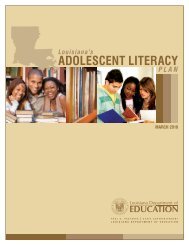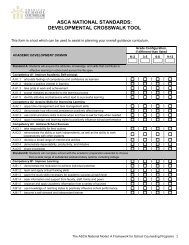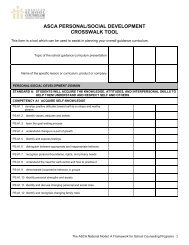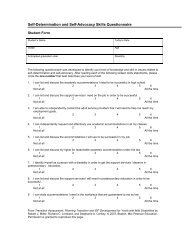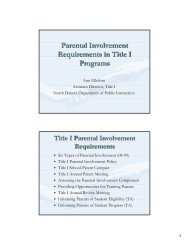- Page 1 and 2: Further Information on Teacher Eval
- Page 3 and 4: The Framework for Teaching http://w
- Page 5 and 6: McREL’s Teacher Evaluation System
- Page 7 and 8: The Framework for Teaching http://w
- Page 9 and 10: McREL’s Teacher Evaluation System
- Page 12 and 13: Table of Contents Acknowledgements
- Page 14 and 15: Acknowledgements This report was fu
- Page 16 and 17: What does research using the CLASS
- Page 18 and 19: Childhood Environmental Rating Scal
- Page 20 and 21: 01 Investing in Effective Teacher-C
- Page 22 and 23: 02 The Classroom Assessment Scoring
- Page 24 and 25: Organization of the CLASS The CLASS
- Page 26 and 27: Research Findings on the CLASS Rese
- Page 30 and 31: 03 Improving Teacher-Child Interact
- Page 32 and 33: Step 3: Implementation - Data Colle
- Page 34 and 35: processes by which teachers and pro
- Page 36 and 37: CASE STUDY The Head Start Professio
- Page 38 and 39: (2) building capacity to assess tea
- Page 40 and 41: Step I: Planning and Decision Makin
- Page 42 and 43: skills until they were in classroom
- Page 44 and 45: How can I create buy-in for the use
- Page 46 and 47: within each participating center or
- Page 48 and 49: How long are observers certified to
- Page 50 and 51: Because we knew that CLASS scores f
- Page 52 and 53: RECOMMENDATION Sharing Data With Pr
- Page 54 and 55: Effective Partnerships Can Allow Ea
- Page 56 and 57: Step 1. Planning and Decision Makin
- Page 58 and 59: Developing Professional Development
- Page 60 and 61: In one study we found that preschoo
- Page 62 and 63: Case Study Minnesota’s Center for
- Page 64 and 65: Minimize fragmentation and program
- Page 66 and 67: elementary teachers, or to expect a
- Page 68 and 69: Linking Assessment and Coaching Sta
- Page 70 and 71: 2. Note the language of the observe
- Page 72 and 73: Issues of Cultural Sensitivity The
- Page 74 and 75: As initiatives move forward, policy
- Page 76 and 77: Raver, C.C., Jones, S.M., Li-Grinin
- Page 78:
What type of data should be reporte
- Page 81 and 82:
Classroom Observation Measures: CLA
- Page 83 and 84:
www.teachstone.com | tel 434.293.39
- Page 85 and 86:
CASTL Curry School of Education Mea
- Page 87 and 88:
CASTL Curry School of Education Mea
- Page 89:
The Framework for Teaching Evaluati
- Page 92 and 93:
The Danielson Group 12 Gordon Way
- Page 94 and 95:
INTRODUCTION Introduction The Frame
- Page 96 and 97:
DOMAIN 1
- Page 98 and 99:
1a KNOWLEDGE OF CONTENT AND PEDAGOG
- Page 100 and 101:
1a KNOWLEDGE OF CONTENT AND PEDAGOG
- Page 102 and 103:
1b DEMONSTRATING KNOWLEDGE OF STUDE
- Page 104 and 105:
1b DEMONSTRATING KNOWLEDGE OF STUDE
- Page 106 and 107:
1c SETTING INSTRUCTIONAL OUTCOMES 1
- Page 108 and 109:
1c SETTING INSTRUCTIONAL OUTCOMES U
- Page 110 and 111:
1d DEMONSTRATING KNOWLEDGE OF RESOU
- Page 112 and 113:
1d DEMONSTRATING KNOWLEDGE OF RESOU
- Page 114 and 115:
1e DESIGNING COHERENT INSTRUCTION 1
- Page 116 and 117:
1e DESIGNING COHERENT INSTRUCTION U
- Page 118 and 119:
1f DESIGNING STUDENT ASSESSMENTS 1f
- Page 120 and 121:
1f DESIGNING STUDENT ASSESSMENTS UN
- Page 122 and 123:
DOMAIN 2 26
- Page 124 and 125:
2a CREATING AN ENVIRONMENT OF RESPE
- Page 126 and 127:
2a CREATING AN ENVIRONMENT OF RESPE
- Page 128 and 129:
2b ESTABLISHING A CULTURE FOR LEARN
- Page 130 and 131:
2b ESTABLISHING A CULTURE FOR LEARN
- Page 132 and 133:
2c MANAGING CLASSROOM PROCEDURES 2c
- Page 134 and 135:
2c MANAGING CLASSROOM PROCEDURES UN
- Page 136 and 137:
2d MANAGING STUDENT BEHAVIOR 2d Man
- Page 138 and 139:
2d MANAGING STUDENT BEHAVIOR UNSATI
- Page 140 and 141:
2e ORGANIZING PHYSICAL SPACE 2e Org
- Page 142 and 143:
2e ORGANIZING PHYSICAL SPACE UNSATI
- Page 144 and 145:
DOMAIN 3 48
- Page 146 and 147:
3a COMMUNICATING WITH STUDENTS 3a C
- Page 148 and 149:
3a COMMUNICATING WITH STUDENTS UNSA
- Page 150 and 151:
3b QUESTIONING AND DISCUSSION TECHN
- Page 152 and 153:
3b QUESTIONING AND DISCUSSION TECHN
- Page 154 and 155:
3c ENGAGING STUDENTS IN LEARNING 3c
- Page 156 and 157:
3c ENGAGING STUDENTS IN LEARNING UN
- Page 158 and 159:
3d USING ASSESSMENT IN INSTRUCTION
- Page 160 and 161:
3d USING ASSESSMENT IN INSTRUCTION
- Page 162 and 163:
3e DEMONSTRATING FLEXIBILITY AND RE
- Page 164 and 165:
3e DEMONSTRATING FLEXIBILITY AND RE
- Page 166 and 167:
DOMAIN 4 70
- Page 168 and 169:
4a REFLECTING ON TEACHING 4a Reflec
- Page 170 and 171:
4a REFLECTING ON TEACHING UNSATISFA
- Page 172 and 173:
4b MAINTAINING ACCURATE RECORDS 4b
- Page 174 and 175:
4b MAINTAINING ACCURATE RECORDS UNS
- Page 176 and 177:
4c COMMUNICATING WITH FAMILIES 4c C
- Page 178 and 179:
4c COMMUNICATING WITH FAMILIES UNSA
- Page 180 and 181:
4d PARTICIPATING IN A PROFESSIONAL
- Page 182 and 183:
4d PARTICIPATING IN A PROFESSIONAL
- Page 184 and 185:
4e GROWING AND DEVELOPING PROFESSIO
- Page 186 and 187:
4e GROWING AND DEVELOPING PROFESSIO
- Page 188 and 189:
4f SHOWING PROFESSIONALISM 4f Showi
- Page 190 and 191:
4f SHOWING PROFESSIONALISM UNSATISF
- Page 192 and 193:
Charlotte Danielson The Framework f
- Page 194 and 195:
Correlation between the Danielson F
- Page 196 and 197:
Marzano Suite for Connecting Teache
- Page 198 and 199:
Research Base and Validation Studie
- Page 200 and 201:
Research Base and Validation Studie
- Page 202 and 203:
Research Base and Validation Studie
- Page 204 and 205:
MARZANO Research Laboratory The Mar
- Page 206 and 207:
2. Tracking Student Progress The te
- Page 208 and 209:
Design Question #6: What will I do
- Page 210 and 211:
Lesson Segments Addressing Content
- Page 212 and 213:
3. Previewing New Content The teach
- Page 214 and 215:
5. Processing New Information Durin
- Page 216 and 217:
7. Recording and Representing Knowl
- Page 218 and 219:
Design Question #3: What will I do
- Page 220 and 221:
11. Using Homework When appropriate
- Page 222 and 223:
13. Examining Errors in Reasoning W
- Page 224 and 225:
15. Revising Knowledge The teacher
- Page 226 and 227:
17. Engaging Students in Cognitivel
- Page 228 and 229:
Lesson Segments Enacted on the Spot
- Page 230 and 231:
3. Managing Response Rates The teac
- Page 232 and 233:
5. Maintaining a Lively Pace The te
- Page 234 and 235:
8. Providing Opportunities for Stud
- Page 236 and 237:
Design Question #7: What will I do
- Page 238 and 239:
12. Acknowledging Adherence to Rule
- Page 240 and 241:
14. Using Verbal and Nonverbal Beha
- Page 242 and 243:
17. Asking Questions of Low-Expecta
- Page 244 and 245:
Domain 2 Planning and Preparing Pla
- Page 246 and 247:
Planning and Preparing for Special
- Page 248 and 249:
3. Evaluating the Effectiveness of
- Page 250 and 251:
Domain 4 Collegiality and Professio
- Page 252 and 253:
Promoting District and School Devel
- Page 254 and 255:
INTRODUCTION The protocol in this d
- Page 256 and 257:
Versions of the Protocol Three diff
- Page 258 and 259:
What is the teacher doing to commun
- Page 260 and 261:
What am I observing right now? Is i
- Page 262 and 263:
Using the Observational Protocol fo
- Page 264 and 265:
The leader starts by reminding ever
- Page 266 and 267:
APPENDIX A Observational Protocol (
- Page 268 and 269:
Lesson Segments that Are Enacted on
- Page 270 and 271:
APPENDIX B Observational Protocol (
- Page 272 and 273:
3. Previewing new content (e.g. the
- Page 274 and 275:
4. Using physical movement (e.g. th
- Page 276 and 277:
APPENDIX C Observational Protocol (
- Page 278 and 279:
Design Question #1: What will I do
- Page 280 and 281:
patterns The physical layout of th
- Page 282 and 283:
Design Question #2: What will I do
- Page 284 and 285:
Innovating Applying Developing Begi
- Page 286 and 287:
When appropriate (as opposed to rou
- Page 288 and 289:
Design Question #4: What will I do
- Page 290 and 291:
Lesson Segments Enacted on the Spot
- Page 292 and 293:
Teacher uses technology to keep tra
- Page 294 and 295:
Notes: 9. Presenting Unusual or Int
- Page 296 and 297:
Certificate of merit Token economie
- Page 298 and 299:
Teacher Evidence Teacher makes sur
- Page 300 and 301:
McREL’s Teacher evaluation system
- Page 302 and 303:
McREL’s Teacher Evaluation System
- Page 304 and 305:
• Gather data, artifacts, and/or
- Page 306 and 307:
Teachers demonstrate leadership in
- Page 308 and 309:
accordingly. Teachers keep abreast
- Page 310 and 311:
Partnership for 21 st Century Skill
- Page 312 and 313:
Component 6: Post-Observation Confe
- Page 314 and 315:
Instructions for completing the Rub
- Page 316 and 317:
Observation c. Teachers lead the te
- Page 318 and 319:
Observation d. Teachers adapt their
- Page 320 and 321:
Observation c. Teachers recognize t
- Page 322 and 323:
Observation d. Teachers integrate a
- Page 324 and 325:
Standard V: Teachers reflect on the
- Page 326 and 327:
Teacher Summary Evaluation Rating F
- Page 328 and 329:
Standard III: Teachers Know the Con
- Page 330 and 331:
Standard V: Teachers Reflect on The
- Page 332 and 333:
Professional Development Plan Schoo
- Page 334 and 335:
Professional Development Plan—End
- Page 336 and 337:
Appendix A: Glossary For purposes o
- Page 338 and 339:
11. Performance Rating Scale—The
- Page 340 and 341:
Example: Scored Teacher Evaluation
- Page 342 and 343:
Comments Element A. While your clas
- Page 344 and 345:
e. Teachers work collaboratively wi
- Page 346 and 347:
Observation c. Teachers recognize t
- Page 348 and 349:
Observation d. Teachers integrate a
- Page 350 and 351:
Standard V: Teachers reflect on the
- Page 352 and 353:
Standard II: Teachers Establish a R
- Page 354 and 355:
Standard IV: Teachers Facilitate Le
- Page 356 and 357:
Example: Completed Teacher Summary
- Page 358 and 359:
Example: Completed Professional Dev
- Page 360 and 361:
Example: Completed Professional Dev
- Page 362 and 363:
A COMPARISON OF MCREL’S TEACHER E
- Page 364 and 365:
INTRODUCTION In April of 2011, the
- Page 366 and 367:
moderator by referencee to the text
- Page 368 and 369:
Figure 3. Percentage of Ratings whe
- Page 370 and 371:
Figure 5. Percentage of Ratings by
- Page 372 and 373:
Figure 6. Example: McREL Standards
- Page 374 and 375:
APPENDIX A: INTASC MODEL CORE TEACH
- Page 376 and 377:
InTASC Model Core Teaching Standard
- Page 378 and 379:
InTASC Model Core Teaching Standard
- Page 380 and 381:
InTASC Model Core Teaching Standard
- Page 382 and 383:
InTASC Model Core Teaching Standard
- Page 384 and 385:
InTASC Model Core Teaching Standard
- Page 386 and 387:
InTASC Model Core Teaching Standard
- Page 388 and 389:
InTASC Model Core Teaching Standard
- Page 390 and 391:
InTASC Model Core Teaching Standard
- Page 392 and 393:
InTASC Model Core Teaching Standard
- Page 394 and 395:
InTASC Model Core Teaching Standard
- Page 396 and 397:
InTASC Model Core Teaching Standard
- Page 398 and 399:
InTASC Model Core Teaching Standard
- Page 400 and 401:
InTASC Model Core Teaching Standard
- Page 402 and 403:
InTASC Model Core Teaching Standard
- Page 404 and 405:
InTASC Model Core Teaching Standard
- Page 406 and 407:
InTASC Model Core Teaching Standard
- Page 408 and 409:
InTASC Model Core Teaching Standard
- Page 410 and 411:
InTASC Model Core Teaching Standard
- Page 412 and 413:
InTASC Model Core Teaching Standard
- Page 414 and 415:
InTASC Model Core Teaching Standard
- Page 416 and 417:
InTASC Model Core Teaching Standard
- Page 418 and 419:
InTASC Model Core Teaching Standard
- Page 420 and 421:
InTASC Model Core Teaching Standard
- Page 422 and 423:
InTASC Model Core Teaching Standard
- Page 424 and 425:
InTASC Model Core Teaching Standard
- Page 426 and 427:
InTASC Model Core Teaching Standard
- Page 428 and 429:
InTASC Model Core Teaching Standard
- Page 430 and 431:
InTASC Model Core Teaching Standard
- Page 432 and 433:
InTASC Model Core Teaching Standard
- Page 434 and 435:
InTASC Model Core Teaching Standard
- Page 436 and 437:
InTASC Model Core Teaching Standard
- Page 438 and 439:
InTASC Model Core Teaching Standard
- Page 440 and 441:
APPENDIX B: MCREL TEACHER EVALUATIO
- Page 442 and 443:
McREL Teacher Evaluation Standards
- Page 444 and 445:
McREL Teacher Evaluation Standards
- Page 446 and 447:
McREL Teacher Evaluation Standards
- Page 448 and 449:
McREL Teacher Evaluation Standards
- Page 450 and 451:
McREL Teacher Evaluation Standards
- Page 452 and 453:
McREL Teacher Evaluation Standards
- Page 454 and 455:
McREL Teacher Evaluation Standards
- Page 456 and 457:
McREL Teacher Evaluation Standards











